- Home
- Lloyd Alexander
The Castle of Llyr (The Chronicles of Prydain) Page 9
The Castle of Llyr (The Chronicles of Prydain) Read online
Page 9
“We would have done you a kindness,” Taran cried. “And you repay us with treachery.”
“I say, that’s true enough,” called Prince Rhun. “How do you expect anyone to help you if they’re buried in here?”
Faint though it was, a sobbing sound drifted from beyond the blocked passageway. “Too long!” moaned the voice of Glew. “Too long! I can wait no more in this ghastly cave! Who knows whether Dallben would care about my fate? Very likely he wouldn’t. It must be done now. Now!”
“Glew,” Taran said, forcing himself to be as calm and patient as he could, for he was convinced the giant had taken leave of his senses, “there is nothing we alone can do for you or we would have done it before this.”
“But there is! There is!” cried Glew. “You shall help with my potions. I’m sure I can brew another to bring me back to size. That’s all I ask. Is that too much?”
“If you want us to help you cook up more of those dreadful messes you fed Llyan,” called Fflewddur, “you’re taking a curious way to win our friendship.” The bard hesitated and his eyes widened in sudden dismay. “Great Belin,” he murmured, “as he did with Llyan … !”
Even as the bard spoke, Taran’s legs began to quake, for the same thought had occurred to him. “Fflewddur,” he whispered, “he is indeed out of his wits. This cavern has driven him mad.”
“Not a bit of it,” replied the bard. “It makes excellent sense, in a nasty, horrible fashion. He has no one else to try his concoctions on!” He pressed to the stone and cupped his hands around his mouth. “You shan’t do that, you wretched, sniveling worm!” he shouted. “We won’t swallow your evil stews! Even if you starve us! And if you try to cram them down our throats, you’ll learn that a Fflam can bite!”
“I promise,” pleaded Glew, “you won’t have to swallow a thing. I’ll take all the risks myself. Terrible risks they are, too. Suppose I should turn into a puff of smoke and blow away? You never know, when you’re dealing with such recipes. It could happen.”
“I wish it would,” muttered Fflewddur.
“No, no,” Glew went on, “this won’t hurt you a bit, you can be sure. It won’t take more than a moment of your time. Half a moment! And I shall only need one of you. Only one! You can’t say that’s asking too much, you can’t be so selfish …”
Glew’s voice had risen to a frenzy and he had begun shouting and wailing so loudly and rapidly Taran could barely make out the words; but as he listened, Taran felt the blood drain from his heart, a chill held and shook him as Glew babbled on.
“Glew,” he cried, despair welling up in him, “what do you mean to do with us?”
“Please, please try to understand,” returned Glew’s voice. “It’s my only chance. I’m sure it will work. I’ve thought it over carefully ever since I’ve been in this awful hole. I know I can brew the right potion; I have all I need. Except one thing. One tiny little ingredient. It won’t hurt you a bit; you won’t feel a thing, I swear it to you.”
Taran gasped in horror. “You mean to kill one of us!”
There was a long silence. Finally Glew’s voice reached the companions again; it sounded as though Glew’s feelings had been hurt. “You make it sound so—so raw!”
“Great Belin,” shouted Fflewddur, “let me get my hands on your scrawny neck and I’ll make you sound raw!”
There was another silence. “Please,” said Glew faintly, “try to look at it from my side.”
“Gladly,” said Fflewddur. “Just push away that rock.”
“Don’t think it’s easy for me,” Glew went on. “I’m fond of all of you, especially the little fuzzy one; and I feel dreadful about the whole thing. But there’s no chance anyone else will stop down here. You do understand that, don’t you? You aren’t angry? I’d never forgive myself if you were.
“Even now,” he added plaintively, “I don’t know how I’ll ever bring myself to pick out one of you. No, no, I can’t. I haven’t the heart. Don’t ask me to put myself through that torment. No, you shall decide among you. That will be best all around.
“Believe me,” Glew continued, “it will be worse for me than for you. But I’ll shut my eyes, so I won’t see which one of you it is. Then, after it’s over, we’ll try to forget about it. We’ll be the best of good friends—those of you remaining, that is. I’ll lead you out of here, I promise. We’ll find Llyan—oh, it will be good to see her again—and all will be well.
“Don’t go away,” said Glew. “I’ll get a few things ready. I won’t keep you waiting.”
“Glew, listen to me!” called Taran. “This is an evil deed you plan. Set us free!”
No answer came. The rock did not move.
“Dig, friends!” cried Fflewddur, drawing his sword. “Dig for your lives!”
Taran and Gurgi unsheathed their blades and, side by side, attacked the ground beneath the ponderous stone. With all their strength they thrust into the rocky, unyielding earth. Their swordpoints rang on the pebbles, but try as they would they could barely scrape away more than a shallow hole. Prince Rhun sought to force his sword under the rock but succeeded only in snapping the point off the blade.
Taran picked up the bauble. Bending to hands and knees, he scanned every portion of this prison, hoping to find some crack or tiny opening the companions could enlarge. The walls rose sheer and unbroken.
“He has trapped us well,” said Taran, sinking to the ground. “There is but one way out. The way Glew offers us.”
“As I consider it,” said Rhun, “he asked for only one of us. That would leave three to keep searching for the Princess.”
Taran was thoughtful for a moment. “For the first time,” he said bitterly, “I believed I had guessed where Magg meant to bring Eilonwy. To Caer Colur. It is the strongest clue we have gained. Now it is useless to us.”
“Useless?” said Rhun. “Not at all. We need only do as Glew suggests, and the others can be on their way.”
“Do you expect that feeble worm to keep his word?” Fflewddur asked angrily. “I would trust him every bit as much as I would trust Magg.”
“Nevertheless,” said Rhun, “we can’t be sure until we try.”
The companions fell silent at the Prince of Mona’s words. Gurgi, who had crouched on the earth and wrapped his woolly arms around his knees, stared wretchedly at Taran. “Gurgi will go,” the creature whispered faintly, though he trembled so much he could hardly speak. “Yes, yes, he will give his poor tender head for broilings and boilings.”
“Valiant Gurgi,” murmured Taran. “Indeed I know you would give up your poor tender head.” He patted the frightened Gurgi. “But there is no question of that. We must stand together. If Glew wants a life, he shall pay dearly for it.”
Fflewddur once more began digging and chipping at the rock. “I agree with you entirely,” he said. “We must stand as one—to the extent that we have any choice at all. As soon as the little fellow comes back—oh, drat and blast—I don’t know why I keep thinking of him as a little fellow, except that he impresses me that way no matter what his size. He’ll surely seize one of us. He hasn’t the honor of a flea or the heart of a gnat, and he’s desperate. If we fight him, there’s a good chance all of us shall be slain.”
“You cannot mean we should take Glew’s bargain,” said Taran.
“Certainly not,” replied Fflewddur, “I shall stand sword in hand and smite the little fellow about the knees since I can’t reach his head. I only mean to point out the risks. As far as his ridiculous idea of having us choose among ourselves is concerned, I don’t think it even worth a thought.”
“I do,” said Prince Rhun.
Taran turned in surprise to Rhun, not fully understanding his words. The Prince of Mona grinned at him almost shyly.
“It’s the only thing that will satisfy Glew,” said Rhun, “and for that I think it’s a very cheap bargain.”
“No life can be so cheaply held,” Taran began.
“I’m afraid you’re wrong,” answered Rhun
. He smiled and shook his head. “I’ve thought a great deal about this since we’ve been in the cavern, and there’s no sense not facing facts. I—I don’t see that I’ve been any help whatever. On the contrary, I’ve brought nothing but ill luck. Not that I meant to, but it seems that’s the way of it with me. So, if any one of us can be dispensed with, why, I should have to say that person is—myself.
“It’s true,” Rhun quickly went on, disregarding Taran’s cry of protest. “I’m delighted to be of some use for once, especially if it will help Eilonwy. I assure you I won’t mind in the slightest. As Glew says, it will only take a moment.
“There’s not one of you who wouldn’t give up his life for a companion,” Rhun added. “Fflewddur Fflam offered his life for ours in Llyan’s lair. Even now poor Gurgi is willing to offer his.” He raised his head. “A bard, a humble creature of the forest, an Assistant Pig-Keeper.” Rhun’s eyes met Taran’s and in a low voice he said, “Can a Prince do less? I doubt I should ever really be able to measure up to being a true Prince. Except in this.”
Taran looked at Rhun for a long moment. “You speak of measure,” he said. “I had measured you as no more than a feckless princeling. I was wrong. You are a truer Prince and better man than ever I believed. But this sacrifice is not yours to make. You know my oath to your father.”
Prince Rhun grinned again. “Indeed, a heavy oath,” he said. “Very well, I shall lift it from you. I say,” he added, “it’s astonishing, but I wonder what became of all the bats?”
CHAPTER THIRTEEN
The Ladder
“Why—they’re gone!” Taran quickly flashed the golden light about the chamber. “Every one of them!”
“Yes, yes,” Gurgi cried. “No more shriekings and squeakings!”
“I can’t say I’m unhappy about it,” added the bard. “I get along well enough with mice, and I’ve always been found of birds, but when you put the two together I’d just as soon avoid them.”
“The bats may prove our best friends and surest guides,” Taran said. “Rhun has struck on something. The bats have found a way out. If we can only discover it, we can follow them.”
“Quite so,” answered the bard, making a wry face. “First thing would be to turn into bats ourselves. Then, I daresay, we should have no difficulties.”
Taran strode hurriedly from one end of the chamber to the other. He played the bauble’s light over the walls, sending the beams upward to the sloping ceiling of rock, scanning each crevice and outcropping, but saw only a few shallow niches from which some ancient stone had fallen.
Again and again he swept the golden light around the cave. A faint, shadowy line seemed traced amid the stones high above him. He stepped back and studied it carefully. The shadow deepened, and Taran realized it marked a narrow ledge, a flaw in the rock. “There it is!” he called, holding the bauble as steadily as his trembling hands allowed. “There—you can barely make it out, the wall curves and hides it. But see where the rock seems to dip and break …”
“Amazing!” cried Rhun. “Astonishing! It’s a passage, rightly enough. The bats have gone through it. Do you think we can?”
Setting the golden sphere on the ground, Taran strode to the rock face and sought to raise himself by grasping the slight ripples of stone; but the wall was too sheer, his hands slipped, clutched vainly for support, and he fell back before he had been able to climb his own height. Gurgi, too, attempted to scale the smooth surface. For all his agility, he did little better than Taran and he sank down, puffing and moaning.
“Just as I said,” glumly remarked Fflewddur. “All we need is a few pairs of wings.”
Taran had not ceased to stare at the high passageway taunting him with the promise of freedom beyond his reach. “We cannot climb the wall,” he said, frowning, “but there may still be hope.” His eyes turned from the distant ledge to the companions, then back again. “A rope would not help us, even if we had one. There is no means of securing it. But a ladder …”
“Exactly what we need,” said Fflewddur. “But unless you’re prepared to build one on the spot, we shouldn’t waste our time grieving over something we don’t have.”
“We can build a ladder,” Taran said quietly. “Yes. I should have seen it at once.”
“What, what?” cried the bard. “A Fflam is clever, but you’re going far beyond me.”
“We can do it,” replied Taran, “and need seek no further. We ourselves are the ladder.”
“Great Belin!” shouted Fflewddur, clapping his hands. “Of course! Yes, we shall climb on each other’s shoulders.” He ran to the wall and measured it with a glance. “Still too high,” he said, shaking his head. “Even the topmost man would reach it with little to spare.”
“But he would reach it, nevertheless,” insisted Taran. “It is our only escape.”
“His only escape,” corrected the bard. “Whoever climbs out will shorten our ladder by that much. Our choice is hardly better than what Glew gave us,” he added. “Only one of us can save himself.”
Taran nodded. “It may be that he can drop a vine down to the others,” he said. “In that way …” He stopped.
Glew’s voice filtered into the chamber. “Is all well in there?” called the giant. “It’s going splendidly out here. I’ve made everything ready. I hope you’re not too upset. Would one of you mind stepping forward? Don’t tell me which; I don’t want to know. I’m as sorry as you are.”
Taran turned quickly to the Prince of Mona. “I know their hearts and I speak for my companions. Our choice is taken. It is too late to hope to save us. Try to make your way to Caer Colur. Should Kaw find you, he will guide you there.”
“I don’t intend leaving anyone behind,” replied Rhun. “If this is your choice, it is not mine. I shall not …”
“Prince Rhun,” Taran said firmly. “Did you not put yourself under my orders?” The stone had begun to grate in the passageway and Taran could hear Glew’s frantic snuffling. “This, too, you must take,” he said, pressing the bauble into Rhun’s reluctant hand. “It is rightfully Eilonwy’s and it is you who shall give it back to her.” He turned his eyes away. “May it shine brightly on your wedding day.”
Gurgi had clambered to the shoulders of the bard, who braced himself against the wall. Rhun still hesitated. Taran seized him by the collar of his jacket and dragged him forward.
Taran climbed onto Fflewddur’s back, then to Gurgi’s. The human ladder swayed dangerously. Under the weight of the companions, the bard cried for Rhun to hurry. Taran felt Rhun’s hands grasp at him, then slip. From below came Gurgi’s labored breathing. Taran clutched Rhun’s belt and heaved upward, as one knee then the other was thrust upon his shoulders.
“The passage is too far,” gasped Rhun.
“Stand up,” Taran cried. “Steady. You’re nearly there.”
With a last effort, he forced himself to rise as high as he could. Rhun scrabbled at the ledge. Suddenly Taran’s burden was lifted.
“Farewell, Prince of Mona,” he called, as Rhun swung himself to the narrow outcropping and plunged into the passage.
Fflewddur cried a warning and Taran felt himself falling. Dazed and breathless on the stones, he tried to regain his feet. It was utterly dark. He staggered against the bard who pulled him from what Taran realized was the entry to the chamber. A rush of chill air told Taran that Glew had pushed the rock aside, and he sensed, rather than saw, a darker shadow thrust into the opening. Taran unsheathed his blade and swung it wildly. It struck something solid.
“Ah! Ow!” cried Glew. “You mustn’t do that!”
The arm pulled back suddenly. Taran heard Fflewddur draw his blade. Gurgi had scuttled to Taran’s side and was throwing stones as fast as he could pick them up.
“We must stand against him now!” Taran cried. “We shall see whether he’s as great a coward as he is a liar. Hurry! Give him no chance to shut us in again!”
Swords raised, the companions flung themselves out of the chamber. Somewhere, Ta
ran knew, Glew towered above them; but in the blackness he dared not strike with his weapon, fearful of harming Gurgi or Fflewddur stumbling along next to him.
“You’re spoiling it all!” wailed Glew. “I shall have to catch one of you myself. Why are you making me do this? I thought you understood! I thought you wanted to help me!”
Wind whistled over Taran’s head as Glew snatched at him. He threw himself down among the sharp rocks. To one side he heard Fflewddur shout, “Great Belin, the little monster can see better in the dark than we can!” Until now the companions had clung together, but Taran’s sudden movement had torn him away from the others. He groped to rejoin them and, at the same time, to escape Glew’s frantic lunges.
He tumbled against a pile of stones that gave way with a clatter, and went sliding into a stream of noisome liquid.
Glew wailed in resounding despair. “Now you’ve done it! You’ve upset my potions! Stop it, stop it, you’re making a mess of everything!”
What must have been Glew’s foot came stamping down nearly on top of him, as Taran lashed out with his sword. The blade rebounded in his hand, but Glew yelled horribly. Above Taran an almost invisible shadow seemed to be hopping on one leg. The bard was right, Taran thought in terror; the greatest risk from Glew lay in being trampled. The ground shook under the giant’s feet and Taran leaped blindly from the sound.
Next thing he knew, he fell with a splash into one of the pools dotting the cavern. He thrashed wildly and flung out his arms, seeking a handhold on the rocky edge. The water glittered with a cold, pale light. As Taran scrambled out, bright, luminous droplets clung to his drenched garments, his face, hands, and hair. Escape for him was hopeless now; the glow would betray him wherever he sought refuge.
“Run!” Taran shouted to the companions. “Let Glew follow me!”
In one stride the giant was at the pool. By the light of his own dripping body, Taran could make out the huge shape. He thrust forward with his blade. The eager hand of Glew brushed it aside.

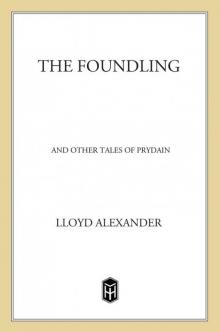 The Foundling and Other Tales of Prydain
The Foundling and Other Tales of Prydain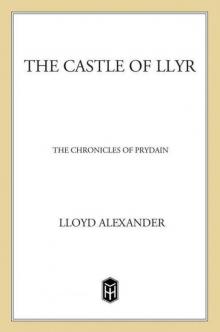 The Castle of Llyr
The Castle of Llyr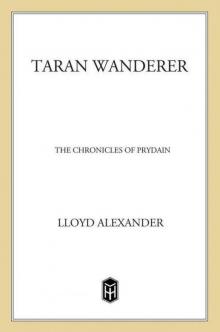 Taran Wanderer (The Chronicles of Prydain)
Taran Wanderer (The Chronicles of Prydain)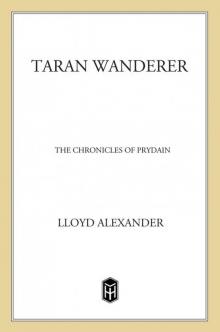 Taran Wanderer
Taran Wanderer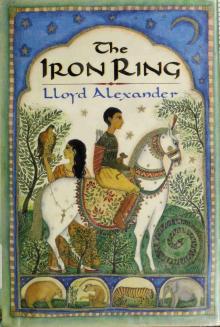 The Iron Ring
The Iron Ring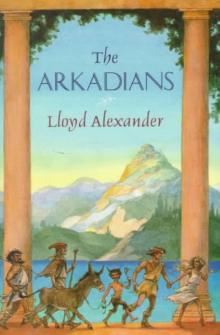 The Arkadians
The Arkadians Fifty Years in the Doghouse
Fifty Years in the Doghouse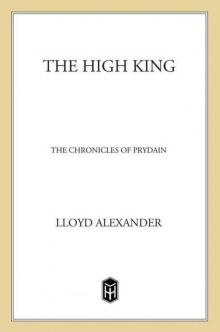 The High King
The High King The Remarkable Journey of Prince Jen
The Remarkable Journey of Prince Jen The Book of Three
The Book of Three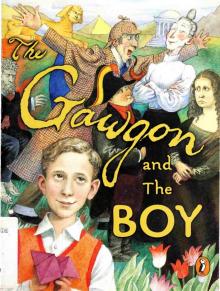 The Gawgon and the Boy
The Gawgon and the Boy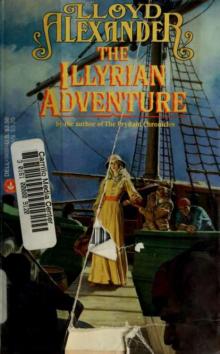 The Illyrian Adventure
The Illyrian Adventure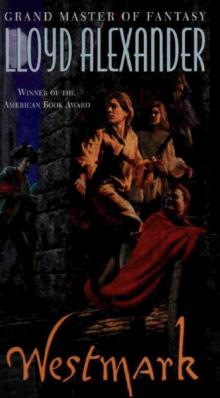 Westmark
Westmark The Black Cauldron
The Black Cauldron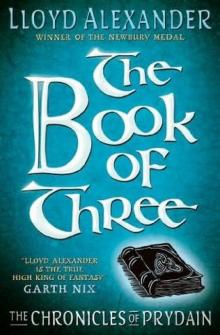 The Book of Three cop-1
The Book of Three cop-1 Taran Wanderer cop-4
Taran Wanderer cop-4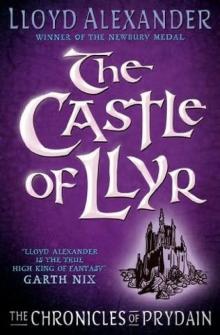 The Castle of Llyr cop-3
The Castle of Llyr cop-3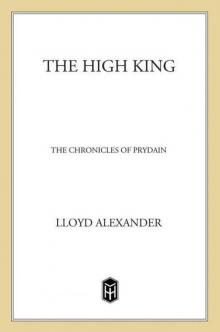 The High King (Chronicles of Prydain (Henry Holt and Company))
The High King (Chronicles of Prydain (Henry Holt and Company))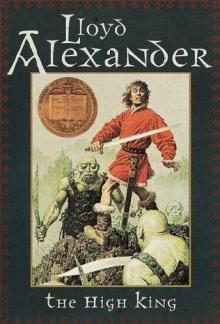 The High King cop-5
The High King cop-5 The Foundling
The Foundling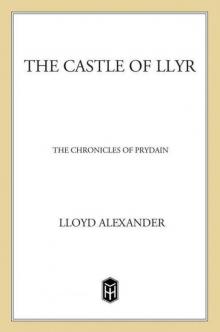 The Castle of Llyr (The Chronicles of Prydain)
The Castle of Llyr (The Chronicles of Prydain)